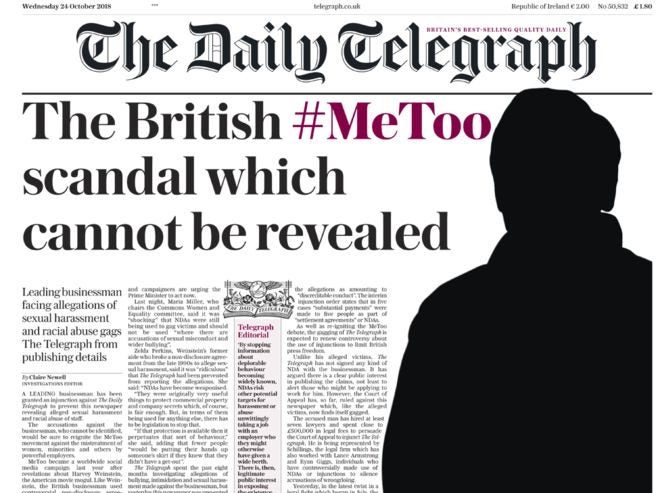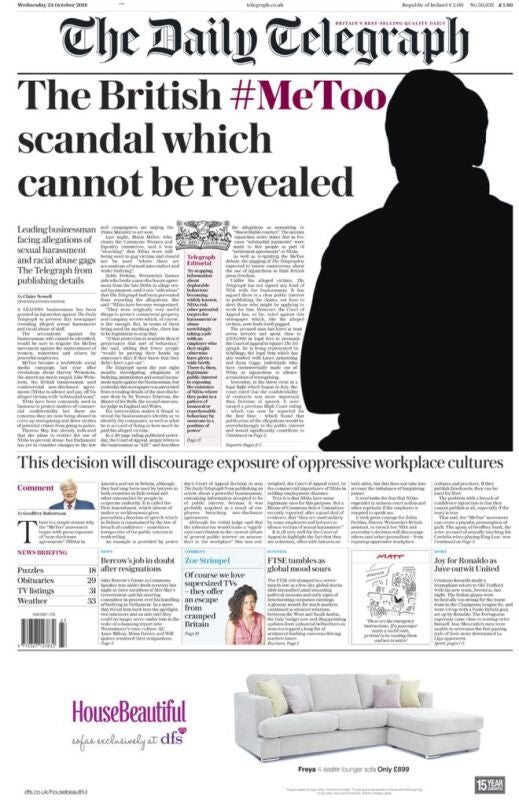
The Telegraph reports that it has been “gagged” from naming a “leading” British businessman after he took out an injunction to stop it revealing allegations of sexual harassment and racial abuse of staff.
The paper claims on its front page today (pictured) that the accusations made against the businessman, whom it cannot currently name, “would be sure to reignite the #MeToo movement”.
It claims he has used non-disclosure agreements, or NDAs, on at least five occasions to silence alleged victims with “substantial sums” of money.
The Telegraph says it has spent eight months investigating claims against the businessman, who it says has so far spent close to £500,000 in legal fees to block his identification in the newspaper.
The Court of Appeal granted the interim injunction on Tuesday. Hearing the case was Master of the Rolls Sir Terence Etherton, Lord Justice Underhill and Lord Justice Henderson.
It had been previously been rejected by High Court judge Mr Justice Haddon-Cave, who said publication of the story was “clearly capable of significantly contributing to a debate in a democratic society and, in particular, making a contribution to a current debate of general public interest on misconduct in the workplace”.
In a leader column today, the Telegraph said: “A High Court judge had refused to grant an injunction. But the Court of Appeal has overturned that ruling and imposed an injunction which remains in place pending a full hearing in the New Year.
“We have, in other words, been gagged, contrary to the age-old principle against prior restraint of the press.
“If the businessman had used defamation laws to block publication, he would not have been granted an injunction since this newspaper would have declared its readiness to prove the truth of the allegations.
“This is, therefore, not just a story about the misuse of NDAs, whose original purpose has been bent and skewed to silence allegations of wrong-doing.
“It is about the freedom of the press to disclose this information and identify the individual concerned.”
In an email to staff from Telegraph editor Chris Evans last night, which was reported on Twitter, he said: “We think it is overwhelmingly in the public interest that this story of ours be told and we are confident that, eventually, we will overturn the injunction.”
The businessman is represented by Schillings International law firm, the same firm that won a super injunction to prevent the reporting of footballer Ryan Giggs’s affair with Big Brother contestant Imogen Thomas.
A super injunction prevents newspapers from reporting even the fact that an injunction exists. Giggs was outed by Twitter users and later named in Parliament by Lib Dem MP John Hemming using parliamentary privilege.
Two Labour MPs, Jess Phillips and Tonia Antoniazzi, hinted on Twitter that they might raise the injunction issue at Prime Minister’s Questions today as both were scheduled to ask a question.
Phillips asked whether Theresa May supported the Court of Appeal’s decision to back non-disclosure agreements used to silence women who have been sexually harassed racially abused.
May said she couldn’t comment on a particular case currently before the courts, but added: “What I will say, what I have said previously, is that sexual harassment in the workplace is against the law – such abhorrent behaviour should not be tolerated.”
On NDAs she added: “Non-disclosure agreements cannot stop people from whistleblowing, but it is clear some employers are using them unethically.
“The Government is going to bring forward measures for consideration for consultation to seek to improve the regulation around non-disclosure agreements and make it absolutely explicit to employees when a non-disclosure agreement does not apply or cannot be enforced.”
Read the full Court of Appeal ruling against the Telegraph.

Email pged@pressgazette.co.uk to point out mistakes, provide story tips or send in a letter for publication on our "Letters Page" blog
